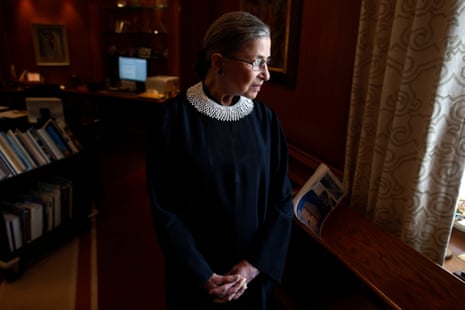Many Americans might struggle to identify a single supreme court justice. But Ruth Bader Ginsburg’s face adorns T-shirts, pins and memorabilia found at gift shops across the country. She is the subject of children’s books and a viral Tumblr account, and even boasts of her own pop culture moniker.
The “Notorious RBG”, one of nine justices on America’s highest court, has emerged as one of the country’s most unlikely celebrities. Although she is 85 years old, a generation of young women have heralded Ginsburg as a leader of the so-called “Resistance”, deeming her a symbolic foil to Donald Trump and his administration.
This month will also see the release of the highly anticipated biopic, On The Basis of Sex, in which the British actor Felicity Jones will portray Ginsburg in the early stages of her career. It is the second film to focus on Ginsburg’s life this year alone. In May, the documentary RBG offered an intimate retrospective of Ginsburg’s upbringing in Brooklyn, New York, and charted her rise to one of the most celebrated public figures in the US.
Some who have followed Ginsburg’s decades-long career find her late-life stardom to be surprising. Though revered by her followers as a liberal firebrand, the justice herself is known to be shy and soft-spoken.
“For Ruth Bader Ginsburg to become a bona fide celebrity, much less in her 80s, is quite extraordinary,” said Jeffrey Toobin, author of The Nine: Inside the Secret World of the Supreme Court.

“I think there’s a recognition, especially on the part of younger women, that there were generations ahead of them that paved the way for their rights. At the same time, they see those rights in peril.”
Ginsburg was born in 1933, at the height of the Depression, to Jewish parents whose families had immigrated from Europe. Her father, Nathan Bader, was a furrier, and her mother, Celia Bader, died when Ginsburg was a teenager. The justice has said neither of her parents had the means to attend college.
In On the Basis of Sex, Ginsburg is first depicted as one of a handful of female students at Harvard law school in the late 1950s. The film follows the trajectory of her career from law professor to the American Civil Liberties Union (ACLU), where she co-founded the Women’s Rights Project in 1972 and went on to challenge six gender discrimination laws before the same supreme court on which she would serve three decades later.
The film’s juxtaposition with the Trump presidency may reinforce Ginsburg’s status as one of the prevailing standard-bearers for equal rights.
When the court ruled this year in favor of a Christian baker who refused to make a cake for a same-sex wedding, Ginsburg condemned the 7-2 decision, writing: “When a couple contacts a bakery for a wedding cake, the product they are seeking is a cake celebrating their wedding – not a cake celebrating heterosexual weddings or same-sex weddings – and that is the service [they] were denied.”

Her tone was even sharper when the court narrowly upheld Trump’s travel ban on several Muslim-majority countries. Ginsburg joined her fellow liberal justice Sonia Sotomayor in a scathing dissent that directly invoked Trump’s vow as a candidate to ban Muslims from entering the US.
“The United States of America is a Nation built upon the promise of religious liberty,” they wrote. “The Court’s decision today fails to safeguard that fundamental principle.”
Ginsburg’s fiery words were not necessarily new: she declared in 2013 that the law barring same-sex couples from being able to marry had created “full marriage and the skim-milk marriage”. But some observers said Ginsburg’s impassioned defense of civil rights had taken on new meaning amid a sense that some of those rights were slowly slipping away.
“For a younger generation, it was really speaking truth to power,” said Jane Sherron De Hart, author of Ruth Bader Ginsburg: A Life.
Ginsburg, she added, appeared to have embraced her notoriety to cement her legacy as an advocate for progressive values.
“She’s really used this kind of platform in ways that are obvious and in ways that are more subtle.”

In April, Ginsburg voluntarily presided over a naturalization ceremony in New York in another unmistakable rebuke of Trump. As she stood before people from 59 countries preparting to take the oath of US citizenship, Ginsburg told the crowd: “We are a nation made strong by people like you.”
Although she did not mention the president by name, her remarks came against the backdrop of the Trump administration’s crackdown on immigration.
Some critics argue that Ginsburg’s words are insufficient given her refusal to retire from the bench under Barack Obama.
Since taking office, Trump has appointed two justices to the court: Neil Gorsuch and Brett Kavanaugh. The latter’s confirmation, which came despite allegations of sexual misconduct, cemented a conservative majority on the bench that will affect decisions for generations to come.
Last month, news that Ginsburg broke three ribs after suffering a fall set off alarm bells in progressive circles that Trump might be handed yet another replacement.
“That is a clear part of her legacy that can’t be ignored,” said Toobin. “It may be that she outlasts Donald Trump … but 85 is not the new anything. She can’t be there forever.
“A third Trump appointment would cement a conservative majority in a way we haven’t seen since the 1930s. And that’s on her.”
Ginsburg defended her decision not to retire under Obama by suggesting at the time that a liberal nominee would be blocked by Republicans in the Senate. Earlier this year, she expressed confidence in her future on the court, stating her intention to remain “at least five more years”.
Bryant Johnson, Ginsburg’s longtime personal trainer, said it would take more than a fall to count the justice out.
Johnson downplayed her injuries, pointing out she had twice battled cancer and broken other bones. Her commitment to fitness was so steadfast, he noted, that she once cut short dinner with Obama so as not to miss her exercise.
“This is new to everybody else, it’s not new to us,” Johnson said. “For Justice Ginsburg, it’s just business as usual.”
